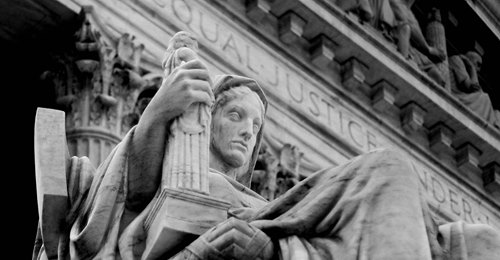Four years after Donald Trump vowed to release his tax returns, the Supreme Court has left him with little choice. There is, however, a bit of a catch.

Four years ago, then-candidate Donald Trump declared publicly that he would release his tax returns. As is well known, the Republican soon after broke his word and abandoned that commitment.
Today, however, a Supreme Court pushed the president a little closer to keeping his word when seven justices rejecting the president’s argument about immunity from a New York grand jury investigating his hush-money scandal.
Manhattan District Attorney Cyrus Vance sought eight years’ worth of Trump’s business and personal tax records for an investigation of payments made to two women who claimed they had affairs with him — allegations the president has consistently denied.
The full ruling in Trump v. Vance is online here. Among the striking elements in the ruling is the breakdown: this was a 7-2 ruling, with a majority made up of Roberts, Ginsburg, Breyer, Sotomayor, Kagan, Kavanaugh, and Gorsuch. Predictably, Thomas and Alito sided with Team Trump — though even they rejected the “absolute immunity” argument presented by the president’s attorneys.
But let’s not brush past too quickly the fact that both of Trump’s handpicked justices — Kavanaugh and Gorsuch — ruled against him in this case.
There was a point in 2018 in which former House Speaker Newt Gingrich (R-Ga.), a close Trump ally, effectively said the point of “the Kavanaugh fight” was to help keep the president’s financial records secret. The comment was unfortunate at the time, and it appears quite a bit worse now.
That said, Trump’s critics should keep their expectations in check. For one thing, the Supreme Court’s majority didn’t say the president has to turn over the materials to the public; the case is about turning over the materials to a Manhattan grand jury, which operates under secrecy.
What’s more, today’s ruling sends the matter back to a lower court to narrow the scope of the prosecutor’s subpoena. In other words, the legal process will continue, and it’s highly unlikely to be resolved ahead of Election Day 2020.
And then, of course, there was the other related and unresolved case at the high court.
Trump v. Mazars was about congressional committees’ efforts to issue subpoenas for the president’s financial records. The ruling (pdf) in this case was also 7-2 — with an identical line-up of justices voting in the majority and minority — and concluded that Congress does, in fact, have the power to demand the materials.
But while that may appear to be a stinging defeat for Trump, it’s not quite that simple: the seven-member court majority also sent the case back to lower courts with new instructions on how best to assess “separation of powers concerns.”
All of which suggests the fight will continue and extend beyond November’s elections. The hope — and by some measures, expectation — was that the Supreme Court rulings would resolve the questions, but as of this morning, it appears the justices had other ideas.
None of this is good news for Trump, at least insofar as his arguments were rejected by the Supreme Court, but the president wanted to continue to shield his secret financial records, and the rulings let him do exactly that — for now.
Postscript: For his part, Trump spent part of the morning whining on Twitter about “political prosecutions” and “prosecutorial misconduct.” There’s no reason to assume he even knows what these phrases mean, but tweeting them probably helped the president feel better.






